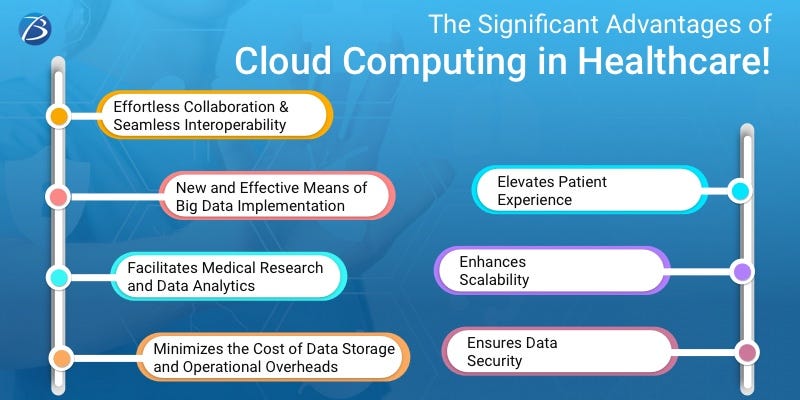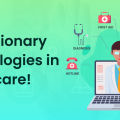The Significant Advantages of Cloud Computing in Healthcare!

Cloud computing in Healthcare is growing at a rapid rate. It refers to a third-party provider offering a ready-made cloud storage infrastructure consisting of remote servers, databases, and repositories to healthcare organizations or individual practitioners. Cloud services are used to store, manage, and process healthcare data. The healthcare entities availing of Cloud services usually pay as per the services consumed. With a growing trend for EMR integration to store patient data, Cloud computing services have become indispensable for customers.
Consequently, the demand curve for Cloud computing services is on the rise. Take a look at these amazing stats as reported by the online portal prnewswire.com:
The estimated market value for Cloud computing in healthcare for the year 2022 was 40.1 billion USD. The market value is expected to grow at a CAGR of 18.7% and reach 76.8 billion USD by the year 2026.
This post outlines the key offerings of Cloud computing services and their noteworthy benefits to Healthcare Service Providers.
What are the different kinds of Cloud Computing Models in Healthcare?
The core models of Cloud computing in Healthcare revolve around distribution and deployment.
The Cloud distribution models available are:
IaaS (Infrastructure as a Service) – Customers are provided with an IT infrastructure as well as an OS that is used for deploying their apps.
SaaS (Software as a Service) – The customer deploys their app or software solution using the IT infrastructure offered by the provider.
PaaS (Platform as a Service) – The customer gets an entire ready-made platform that includes OS, IT infrastructure, software apps, and all other components needed.
The Cloud Deployment models available are Public Cloud (all stakeholders can access), Community Cloud (can be accessed by a group of medical entities), Private Cloud (can be accessed by a single healthcare organization and other facilities belonging to the same chain), and Hybrid Cloud (a combination of the existing deployment models).
Cloud Computing in Healthcare: Noteworthy Benefits

Effortless Collaboration & Seamless Interoperability
Earlier patients’ healthcare records were documented and maintained in files. There were separate files for every practitioner or specialist consulted, and each hospital or imaging lab visited. This complicated matters for patients as well as doctors. Patients had to carry every file for each doctor visit and physicians found it difficult to collaborate whenever they had to review a patient’s previous treatment history.
Cloud computing resolved this challenge by storing medical data on a secure platform with hosting solutions as well as virtual machines to enable quick access. Healthcare firms can either use Azure’s Blob storage or the AWS S3 service for storing and retrieving medical records. Patients’ medical records collated from different sources are consolidated in a centralized storage system powered by Cloud. These records can be collaboratively accessed and shared in real-time via web portals; by authorized stakeholders including doctors, nurses, and caregivers from any location. Cloud also offers additional perks like remote conferencing, providing prompt updates on patient conditions and healthcare developments.
Cloud computing saves time and efforts of both patients and doctors. Once patients’ medical records and lab reports are saved in EMR (Electronic Medical Records), they do not need to manage or carry files for doctor visits. Moreover, it becomes easier for specialists to review cases as the results of all previous doctor interactions are available in one single place. Improved visibility into patients’ medical history helps specialists to effectively co-operate with one another whenever there’s a need for consultation or recommendation. Furthermore, cloud storage allows physicians to analyze patient treatment data for future reference as well as research.
Storing patients’ medical data in the Cloud facilitates interoperability between various departments of a hospital and different sub-domains of the healthcare sector such as insurance firms, pharmaceutical companies, and imaging centers regardless of their geographical location. Cloud computing improves the overall efficiency of medical care and clinical decision-making and minimizes costly mistakes.
New and Effective Means of Big Data Implementation
These days most healthcare bodies employ healthcare app development services to digitalize their operations. This leads to the generation of loads of Big data that is accumulated via patient EMRs. This data holds a huge potential to elevate healthcare outcomes. Cloud-powered solutions for data storage have opened up new possibilities for effective implementation and utilization of Big data that was inaccessible during yesteryears. This is because the volume of data collected is humongous and could not be managed by one single server.
Cloud’s contribution to big data utilization is enormous. Big data, if effectively implemented, proves beneficial in detecting subtle correlations in patients’ ailments. This enables doctors to identify the correct cause of the disease and get insights into the most suitable treatment options for a specific set of symptoms. Big data also helps in predicting the occurrence of epidemics much before the epidemic manifests its obvious signs; this way the healthcare industry can detect public health threats well in advance and save lives.
Facilitates Medical Research and Data Analytics
Cloud computing allows researchers and medical professionals to reap the advantages of a high computing capability in storing and manipulating structured as well as unstructured data; and that too, at much lower expenses. With Cloud, huge volumes of relevant patient data collected from various sources can be securely stored and quickly processed using AI algorithms and Big data analytics tools for obtaining actionable insights. Therefore, it becomes easy for researchers to store data collected from various fields and condense this data to get a clearer and more advanced visibility of the research subjects. Advanced data analytics enables healthcare service providers to provide highly customized patient care, suggest personalized treatment plans, and make faster clinical decisions.
Minimizes the Cost of Data Storage, and Operational Overheads
Healthcare facilities that handle mobile apps, electronic medical records, patient portals, big data analytics, etc. can select from two options for the storage and management of data – an on-site data storage mechanism or services from a Cloud Provider. Medical companies opting for on-premise data storage need to spend heavily on setting up the required software infrastructure and investing in top-quality hardware drives for data storage so that data is securely stored and accessible whenever needed. And, since a huge amount of data is generated, all in-house software solutions are not capable of handling it. As such, medical bodies often have to invest in additional physical servers when the data load increases, ending up incurring extra expenses.
But, Healthcare firms availing of services from reliable Cloud providers get a good bargain - secure, efficient, and scalable services at much lower costs. Cloud providers manage all data storage prerequisites on behalf of the healthcare firm. Therefore, by hosting their ERP in the Cloud, healthcare providers can avoid infrastructure costs and the need for maintaining complex protocols, and they can pay for only those services that they avail of. Cloud computing also offers better support for operational functions like HR and administrative processes. Hence, cloud services are a cost-efficient option for medical providers who can outsource operational burdens and concentrate on their core service - patient care.
Elevates Patient Experience
Cloud computing improves patients’ engagement, communication, and awareness about their medical conditions. Patients can remotely access their healthcare data in real-time including treatment details, test outcomes, and doctors’ notes, they also receive instant notifications on updates. Cloud-based solutions ensure that no patient is overprescribed or advised unnecessary lab testing. Furthermore, Cloud computing supports telehealth solutions, the most popular and convenient healthcare service category amongst patients.
Cloud computing centralizes data storage so that patients can control and participate in decision-making processes. Moreover, Cloud simplifies data recovery; it offers automated data backups, and the data is maintained in a manner that there isn’t any single touchpoint of the stored data.
Enhances Scalability
Self-hosted storage solutions come with limited data capabilities and so, healthcare organizations using such solutions are unable to expand their bandwidth as per the scaling need and often need to employ extra servers during increased caseloads.
Contrarily, cloud models offer the flexibility to upscale or downscale the data storage capacity as per the demand based on the patient inflow. This way, medical providers can promptly respond to and handle surged loads arising due to unforeseen situations like increased patient activity during a pandemic. And, if medical services opt for the pay-as-you-go approach, this strategy proves cost-effective as well. Cloud providers also handle tasks like data security, patching, and upgrades on behalf of their clients.
Ensures Data Security
The more digital data, the more is it vulnerable to security breaches and cyber-attacks. And, it has been observed that healthcare data and sensitive patient information are soft targets for carrying out malicious practices. Here, Cloud computing plays a crucial role in securing data.
Cloud being a storehouse of sensitive data, providers adopt additional security measures and comply with mandated standards like HIPAA (Healthcare Insurance Portability and Accountability Act), GDPR (Europe’s General Data Protection Regulation), and HITRUST to protect their servers from cyber security violations. Cloud services also provide facilities like automated data backup, risk management plans, disaster recovery options, and continuous security monitoring. Hence, even in cases of data breaches or unauthorized access healthcare firm can recover their data effortlessly.
Final Thoughts:
Cloud Computing is the most viable option for Healthcare Service Providers to securely collect, store, manage, and maintain the PHI (personal health information) of patients. Cloud solutions come with endless offerings for consumers including customized patient care, data analytics, Big data utilization, and most importantly reduces operational costs. Cloud solutions enhance the overall efficiency of healthcare services and provide them a competitive edge over peers. So, it’s high time healthcare entities should seek technical assistance from dependable Cloud computing services.
Other articles and publications:
Articles and publications of other companies:
 Pixel Values Technolabs: Your Trusted Partner for The Best Codeigniter Development Services In India
Pixel Values Technolabs: Your Trusted Partner for The Best Codeigniter Development Services In India
- +1 (469) 277-0804
- 8305 Tripoli Trl, Frisco, TX 75034, United States
- www.biz4solutions.com/











